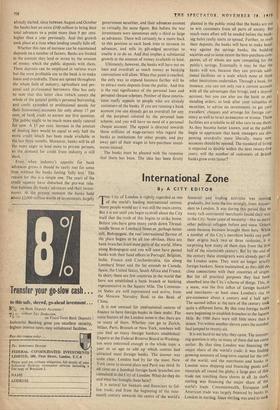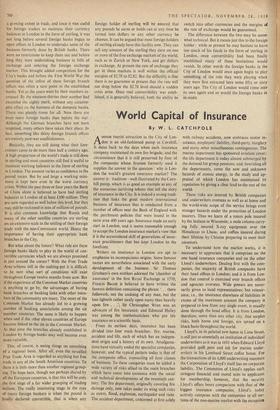To complete the picture of London's insurance associations, reference should
be made to another building near Watling Street—the Hall in Alder- manbury of the Chartered Insurance Institute, an educational and social body which has a member- ship of 38,000 and is associated with other insur- ance institutes throughout the Commonwealth. From the Hall, which is provided with a fine library and museum, the CH supplies postal as well as oral tuition and holds examinations which attract candidates in many parts of the world. It organises educational conferences and through its local institutes lectures, research projects and social events. Recently it has opened a College of Insurance at Surbiton and appointed a careers officer who can be consulted by those who are interested in careers in insurance.
The great network of insurance institutions in London briefly outlined above faces many prob- lems today in its activities overseas. Intense com- petition exists from protected national companies as well as from other markets and there is much restrictive legislation and discriminatory taxation. Leaders of the industry are none the less confident that London will remain the greatest market supplying the world with insurance. Profits have shrunk recently, particularly in North America. But, as Mr. Charles F. Trustam, chairman of the British Insurance Association, reminded members in his annual statement earlier this year, good health will inevitably be restored to the North American market eventually—and in the mean- time the considerable investment income which accrues to the British insurance companies from
. . . suddenly . . .
. . . boiled right over.
their $1,600 million assets in the United States brings a net gain to the British economy even in the least profitable years. 'Insurance results,' said Mr. Trustam, 'must be judged over the long term UNIT Trusts, an increasingly popular savings medium, are moving in jubilant procession from the financial limbo to which they were rele- gated nearly eighteen years ago. With £78 million of assets behind them they now look forward to an inspiring and brilliant prospect whereas only a year or two back they had little to look to. The Government, very conscious of the problems of inflation, has itself been viewing with some con- cern the spectacle of the small savers throwing in their hands of gilt-edged bonds (generally at a loss) and turning to other and less officially favoured forms of saving. It is little wonder that government securities have been losing favour— it is hardly necessary to point to Dalton 2i per cent. and the losses they brought in their expen- sive train. Their returns are fixed and quite insufficient even to match the fall in the value of money. One expert has worked out that if inflation could be contained at 3 per cent. per annum, Consols would have to stand at 26 (they are 51 now) just so that their net income would match that inflation.
The. Stock Exchange has long offered some pro-
The Qtiestion of
INVESTMENT
Only the Piccadilly Building Society offers Premium Shares —a unique Investment system offering increasing rates of Interest.
Post this Coupon Today
Please send details of Premium Shares NAME
ADDRESS DATE
PICCADILLY BUILDING SOCIETY
ESTATE HOUSE, 31 DOVER STREET, PICCADILLY, LONDON. W.I.
and not on the out-turn of one or two individual years.
London, with 400 years of insurance history behind it, sees no reason to question that dictum.
Fashion for Saving
By DEREK MOORE
to every buyer of even a single unit are the obvious janswer. They provide expertise at a very cheap rate—too cheap, it might be said. These experts choose widely diversified investments within the scope of the trust deed governing the fund. They collect the dividends and see that rights issues, bonuses and so on are duly collected and accounted for. In short unit trusts are a tidy investment.































































 Previous page
Previous page